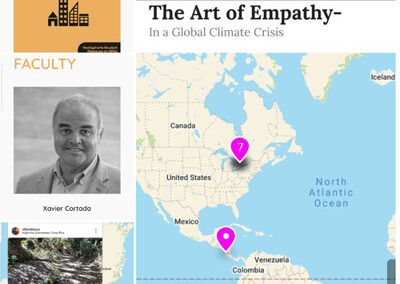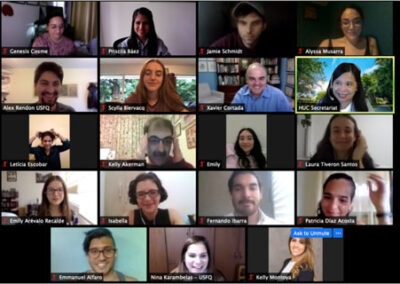The Hemispheric University Consortium is connecting universities and students for critical conversations focused on solving some of the world’s most pressing problems, such as climate change.
Imagine a classroom where students from different institutions in Miami, Mexico, Costa Rica, and Brazil come together through a virtual platform to learn about a specific issue, such as climate change or access to health care. A place where students with different backgrounds and cultures can work together to analyze the complexity of these topics on a local and global level, have in-depth discussions about the differences in their respective countries, and then define actionable steps that lead to bettering their communities and changing the world.
The Hemispheric University Consortium, which has its roots at the University of Miami, is making this type of learning in global classrooms a reality for the students of the member institutions.
“President Julio Frenk envisioned the Hemispheric University Consortium as a space where knowledge is co-constructed throughout Latin America, the Caribbean, and North America—where developments in research and innovation is shared and new generations of students across the Americas become citizens of the world through boundary-spanning academic collaborations that would serve as global engines for their upward social mobility,” said Ali Habashi, a filmmaker and assistant professor of professional practice at the School of Communication.
Amid the pandemic, University of Miami professors like Habashi and artist Xavier Cortada, professor of practice in the College of Arts and Sciences, are taking advantage of global classroom capabilities to foster more live collaborations and active participation among students across barriers.
“Clearly the 2020 pandemic accelerated the forced reality of working with various nuances of online education, especially in synchronous mode,” added Habashi. “On the flip side, it also generated the excitement of embracing its restrictions by exploring innovative virtual partnerships for our hemispheric faculty and students.”
Habashi and Dina Moulioukova, a lecturer of international studies at the University of Miami, participated in designing a joint Collaborative Online International Learning (COIL)-based global classroom with faculty members from Tecnológico de Monterrey, one of the top universities in Mexico. They co-taught the course Global Issues and Filmmaking, a Transdisciplinary Approach, where their students participated in a thought-provoking COIL-based format class with students from Tecnológico de Monterrey.
The course included a series of polls, lectures, discussion-based activities in breakout rooms, and reflections on topics such as human security, globalization, and sustainable development goals. It also entailed a comparative analysis of access to basic and quality health care in the U.S. and Mexico.
Students from both countries were able to share their personal experiences in dealing with their respective health care systems. In Mexico, access to basic health care is considered a human right, according to the country’s constitution; but, it is treated more as a privilege in the United States.
“This productive discussion was inspired by the role that President Julio Frenk played as the minister of health of Mexico from 2000 to 2006,” Habashi pointed out. “He was the driving force behind strategizing and coordinating what is called Seguro Popular Insurance as the main vehicle for materializing universal health care in Mexico.”
According to Habashi, the joint class was an eye-opening experience for the students from both countries to directly hear from each other about the different dynamic set of challenges that their respective health care systems are facing.
Cortada led The Art of Empathy (in a Global Climate Crisis), during the Global Week hosted by Universidad San Francisco de Quito in Quito, Ecuador. During the workshop Cortada asked students from across hemispheric universities to empathize with some of the existential climate crises people were dealing with in 2006. The students were asked to read the concerns from 24 individuals in different parts of the world, who back then communicated to their local media the ways in which climate change was having an adverse effect in their community.
“I want you to think about that person, read the quote, and try to inhabit their life and who they are,” said Cortada. “And part of this discussion we’re going to have at the end of this class is to ask each and every one of you to come up with solutions that addresses the impacts of these different climate change crises.”
“We are delighted that through the Hemispheric University Consortium and with our partner institutions, despite the challenges of COVID-19, we can create virtual collaborations for our students and faculty,” said Felicia Marie Knaul, director of Hemispheric and Global Programs and director of the Institute for Advanced Study of the Americas at the University of Miami. “We look forward to continuing this important work through the consortium to foster collaborations in education, research, and innovation addressing key challenges of the 21st century,” she added.
“We are all from different parts of the world, yet we all have shared experiences through climate change,” said Jamie Schmidt, a University of Miami junior studying opera who participated in Cortada’s workshop. Schmidt proposed climate change solutions to her peers by creating a unified hashtag, “so people can see that these problems are everywhere around the world which can unify us in more of a global perspective.”
Gabriela Geron, Hemispheric University Consortium secretariat, explained that these COIL projects are aimed at developing competences such as critical thinking, international communication, and digital collaboration. “We are empowering the next generation of global citizens in the hemisphere,” she noted.
Habashi is a strong believer in the power global classrooms harness to tackle challenges, create intercultural bonds, and provide a sense of global citizenship among students.
“We need to rethink what constitutes a meaningful global experience in the eyes of our students,” he added. “Whether virtually or physically, we need to explore problem-based opportunities where they can get real field experience, develop empathy for and directly work with stakeholders, and devise sustainable solutions.”
Please visit https://thehuc.org/studsdgs/ for more on the Student Dialogues on Sustainable Development Goals.



